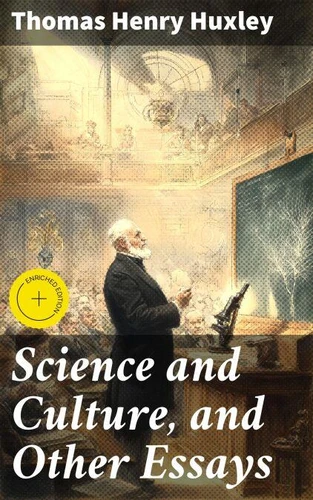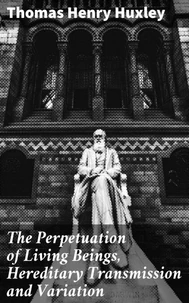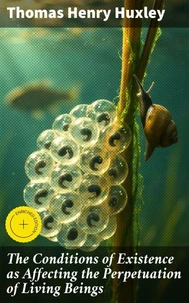Science and Culture, and Other Essays. Enriched edition. Exploring the Nexus of Science and Society in the 19th Century
Par : ,Formats :
Disponible dans votre compte client Decitre ou Furet du Nord dès validation de votre commande. Le format ePub est :
- Compatible avec une lecture sur My Vivlio (smartphone, tablette, ordinateur)
- Compatible avec une lecture sur liseuses Vivlio
- Pour les liseuses autres que Vivlio, vous devez utiliser le logiciel Adobe Digital Edition. Non compatible avec la lecture sur les liseuses Kindle, Remarkable et Sony
 , qui est-ce ?
, qui est-ce ?Notre partenaire de plateforme de lecture numérique où vous retrouverez l'ensemble de vos ebooks gratuitement
Pour en savoir plus sur nos ebooks, consultez notre aide en ligne ici
- Nombre de pages243
- FormatePub
- ISBN4057664606150
- EAN4057664606150
- Date de parution19/05/2021
- Protection num.Digital Watermarking
- Taille2 Mo
- Infos supplémentairesepub
- ÉditeurGOOD PRESS
Résumé
In "Science and Culture, and Other Essays, " Thomas Henry Huxley artfully intertwines the realms of scientific inquiry and cultural contemplation, presenting a collection of essays that explore the interplay between science and society. Huxley employs a clear and persuasive prose style that reflects his deep commitment to empiricism and rational thought, while also engaging with the philosophical implications of scientific advancements.
The essays range from critiques of dogmatic thinking to reflections on education and the moral responsibilities of scientists, all set against the backdrop of the late 19th century's emerging scientific discourse, including Darwinian theory and debates over educational reform. Huxley, often referred to as "Darwin's Bulldog" for his defense of evolution, was a prominent biologist and an avid advocate for science as a tool for social progress.
His experiences as a naturalist and the cultural climate of the Victorian era, characterized by rapid scientific advancement and philosophical upheaval, undoubtedly shaped his perspectives. These essays reflect not only his passion for science but also his concerns about the implications of scientific knowledge on societal values and beliefs. This compelling collection is highly recommended for readers interested in the intersection of science and culture, as well as those who wish to understand Huxley's enduring legacy in advocating for rational thought.
"Science and Culture" serves as a critical reminder of the importance of scientific understanding in an increasingly complex world, making it an essential read for scholars, educators, and anyone invested in the quest for knowledge. In this enriched edition, we have carefully created added value for your reading experience: - A comprehensive Introduction outlines these selected works' unifying features, themes, or stylistic evolutions. - A Historical Context section situates the works in their broader era-social currents, cultural trends, and key events that underpin their creation. - A concise Synopsis (Selection) offers an accessible overview of the included texts, helping readers navigate plotlines and main ideas without revealing critical twists. - A unified Analysis examines recurring motifs and stylistic hallmarks across the collection, tying the stories together while spotlighting the different work's strengths. - Reflection questions inspire deeper contemplation of the author's overarching message, inviting readers to draw connections among different texts and relate them to modern contexts. - Lastly, our hand-picked Memorable Quotes distill pivotal lines and turning points, serving as touchstones for the collection's central themes.
The essays range from critiques of dogmatic thinking to reflections on education and the moral responsibilities of scientists, all set against the backdrop of the late 19th century's emerging scientific discourse, including Darwinian theory and debates over educational reform. Huxley, often referred to as "Darwin's Bulldog" for his defense of evolution, was a prominent biologist and an avid advocate for science as a tool for social progress.
His experiences as a naturalist and the cultural climate of the Victorian era, characterized by rapid scientific advancement and philosophical upheaval, undoubtedly shaped his perspectives. These essays reflect not only his passion for science but also his concerns about the implications of scientific knowledge on societal values and beliefs. This compelling collection is highly recommended for readers interested in the intersection of science and culture, as well as those who wish to understand Huxley's enduring legacy in advocating for rational thought.
"Science and Culture" serves as a critical reminder of the importance of scientific understanding in an increasingly complex world, making it an essential read for scholars, educators, and anyone invested in the quest for knowledge. In this enriched edition, we have carefully created added value for your reading experience: - A comprehensive Introduction outlines these selected works' unifying features, themes, or stylistic evolutions. - A Historical Context section situates the works in their broader era-social currents, cultural trends, and key events that underpin their creation. - A concise Synopsis (Selection) offers an accessible overview of the included texts, helping readers navigate plotlines and main ideas without revealing critical twists. - A unified Analysis examines recurring motifs and stylistic hallmarks across the collection, tying the stories together while spotlighting the different work's strengths. - Reflection questions inspire deeper contemplation of the author's overarching message, inviting readers to draw connections among different texts and relate them to modern contexts. - Lastly, our hand-picked Memorable Quotes distill pivotal lines and turning points, serving as touchstones for the collection's central themes.
In "Science and Culture, and Other Essays, " Thomas Henry Huxley artfully intertwines the realms of scientific inquiry and cultural contemplation, presenting a collection of essays that explore the interplay between science and society. Huxley employs a clear and persuasive prose style that reflects his deep commitment to empiricism and rational thought, while also engaging with the philosophical implications of scientific advancements.
The essays range from critiques of dogmatic thinking to reflections on education and the moral responsibilities of scientists, all set against the backdrop of the late 19th century's emerging scientific discourse, including Darwinian theory and debates over educational reform. Huxley, often referred to as "Darwin's Bulldog" for his defense of evolution, was a prominent biologist and an avid advocate for science as a tool for social progress.
His experiences as a naturalist and the cultural climate of the Victorian era, characterized by rapid scientific advancement and philosophical upheaval, undoubtedly shaped his perspectives. These essays reflect not only his passion for science but also his concerns about the implications of scientific knowledge on societal values and beliefs. This compelling collection is highly recommended for readers interested in the intersection of science and culture, as well as those who wish to understand Huxley's enduring legacy in advocating for rational thought.
"Science and Culture" serves as a critical reminder of the importance of scientific understanding in an increasingly complex world, making it an essential read for scholars, educators, and anyone invested in the quest for knowledge. In this enriched edition, we have carefully created added value for your reading experience: - A comprehensive Introduction outlines these selected works' unifying features, themes, or stylistic evolutions. - A Historical Context section situates the works in their broader era-social currents, cultural trends, and key events that underpin their creation. - A concise Synopsis (Selection) offers an accessible overview of the included texts, helping readers navigate plotlines and main ideas without revealing critical twists. - A unified Analysis examines recurring motifs and stylistic hallmarks across the collection, tying the stories together while spotlighting the different work's strengths. - Reflection questions inspire deeper contemplation of the author's overarching message, inviting readers to draw connections among different texts and relate them to modern contexts. - Lastly, our hand-picked Memorable Quotes distill pivotal lines and turning points, serving as touchstones for the collection's central themes.
The essays range from critiques of dogmatic thinking to reflections on education and the moral responsibilities of scientists, all set against the backdrop of the late 19th century's emerging scientific discourse, including Darwinian theory and debates over educational reform. Huxley, often referred to as "Darwin's Bulldog" for his defense of evolution, was a prominent biologist and an avid advocate for science as a tool for social progress.
His experiences as a naturalist and the cultural climate of the Victorian era, characterized by rapid scientific advancement and philosophical upheaval, undoubtedly shaped his perspectives. These essays reflect not only his passion for science but also his concerns about the implications of scientific knowledge on societal values and beliefs. This compelling collection is highly recommended for readers interested in the intersection of science and culture, as well as those who wish to understand Huxley's enduring legacy in advocating for rational thought.
"Science and Culture" serves as a critical reminder of the importance of scientific understanding in an increasingly complex world, making it an essential read for scholars, educators, and anyone invested in the quest for knowledge. In this enriched edition, we have carefully created added value for your reading experience: - A comprehensive Introduction outlines these selected works' unifying features, themes, or stylistic evolutions. - A Historical Context section situates the works in their broader era-social currents, cultural trends, and key events that underpin their creation. - A concise Synopsis (Selection) offers an accessible overview of the included texts, helping readers navigate plotlines and main ideas without revealing critical twists. - A unified Analysis examines recurring motifs and stylistic hallmarks across the collection, tying the stories together while spotlighting the different work's strengths. - Reflection questions inspire deeper contemplation of the author's overarching message, inviting readers to draw connections among different texts and relate them to modern contexts. - Lastly, our hand-picked Memorable Quotes distill pivotal lines and turning points, serving as touchstones for the collection's central themes.








